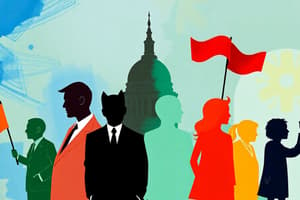Podcast
Questions and Answers
What is the right to freedom from arbitrary arrest an example of?
What is the right to freedom from arbitrary arrest an example of?
- Fundamental Right (correct)
- Legal Right
- Moral Duty
- Political Right
Rights and duties are two separate entities.
Rights and duties are two separate entities.
False (B)
What is a duty?
What is a duty?
A duty is an obligation. It is something we owe to others as social beings.
The tendency in a democratic State is to incorporate certain basic rights in its _________________.
The tendency in a democratic State is to incorporate certain basic rights in its _________________.
What is the right to criticize the government an example of?
What is the right to criticize the government an example of?
Match the following types of duties with their descriptions:
Match the following types of duties with their descriptions:
Legal duties are not punishable by law.
Legal duties are not punishable by law.
What is the relationship between rights and duties?
What is the relationship between rights and duties?
What is liberty according to the basic principles of democracy?
What is liberty according to the basic principles of democracy?
All human beings are not equal and should not be entitled to the same treatment.
All human beings are not equal and should not be entitled to the same treatment.
What are rights according to Ma Cun?
What are rights according to Ma Cun?
Natural rights are based upon the universal law, the law of _______________
Natural rights are based upon the universal law, the law of _______________
Match the following types of rights with their descriptions
Match the following types of rights with their descriptions
What is the primary function of the multi-party system in a democracy?
What is the primary function of the multi-party system in a democracy?
Human rights are synonymous with civil rights
Human rights are synonymous with civil rights
What does rule of law ensure in a democracy?
What does rule of law ensure in a democracy?
What is the meaning of the Greek word 'Demo' in the context of democracy?
What is the meaning of the Greek word 'Demo' in the context of democracy?
Democracy is a form of government in which the people are ruled by a monarch.
Democracy is a form of government in which the people are ruled by a monarch.
Who defined democracy as 'Government of the people, by the people, and for the people'?
Who defined democracy as 'Government of the people, by the people, and for the people'?
In a _______________ democracy, the people rule themselves directly.
In a _______________ democracy, the people rule themselves directly.
What is the purpose of a referendum in a democracy?
What is the purpose of a referendum in a democracy?
In a representative democracy, people make decisions directly.
In a representative democracy, people make decisions directly.
Match the following types of democracy with their characteristics:
Match the following types of democracy with their characteristics:
What is the purpose of a recall in a democracy?
What is the purpose of a recall in a democracy?
Flashcards are hidden until you start studying
Study Notes
Democracy
- Derived from two Greek words: 'demo' (people) and 'krato' (power)
- A form of government where people rule themselves directly or indirectly through their representatives
- Definition: "Government, of the people, by the people, and for the people"
Types of Democracy
- Direct/Pure Democracy: people make decisions directly
- Indirect/Representative Democracy: people elect representatives to make decisions on their behalf
Democratic Tools
- Direct Democracy:
- Referendum: direct and universal vote on a specific proposal
- Initiative: specific number of voters draft a bill and send it to the government for adoption
- Recall: voters can bring back or recall a representative if dissatisfied
- Indirect Democracy:
- Election
Basic Principles of Democracy
- Liberty (freedom)
- Equality (equal opportunity)
- Human rights
- Multi-party system
- Free and fair elections
- Political tolerance
- Citizen participation
- Independence of judiciary
- Rule of law
- Control over abuse of power
- Accountability and transparency
Liberty
- Freedom to do anything without hindering the freedom of others
- Conditioned by law
Equality
- All human beings are equal and should be entitled to same treatment
- Refers to abolition of social privileges and legal discrimination against individuals or groups
Rights
- Certain advantageous conditions of social wellbeing indispensable to the true development of citizens
- Classification:
- Natural Rights
- Moral Rights
- Legal Rights
- Fundamental Rights
Natural Rights
- Based on universal law and common to all people in all countries
Moral Rights
- Based on ethical feelings of man
- Sanctioned by moral opinion of the community
Legal Rights
- Civil Rights:
- Right to life
- Freedom from arbitrary arrest
- Freedom to acquire and hold property
- Right to liberty and free movement
- Freedom to speak and write for publication
- Freedom to meet publicly
- Freedom to form associations for peaceful ends
- Freedom to make contracts
- Right to religion
- Right to education
- Right to work
- Political Rights:
- Right to vote and elect
- Right to be elected
- Right to hold public offices
- Right to petition
- Right to criticize the government
Duties
- An obligation to others as social beings
- Rights and duties are two sides of the same coin
- Classification:
- Moral Duties
- Legal Duties
Studying That Suits You
Use AI to generate personalized quizzes and flashcards to suit your learning preferences.




